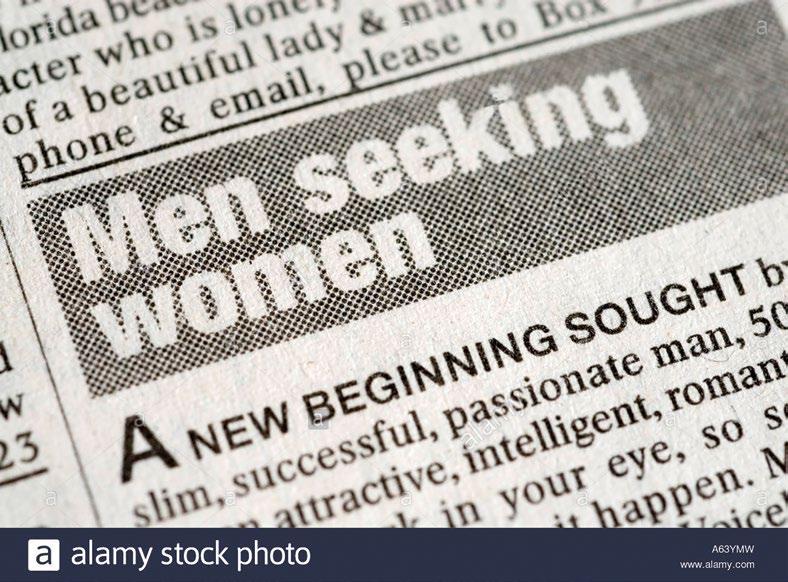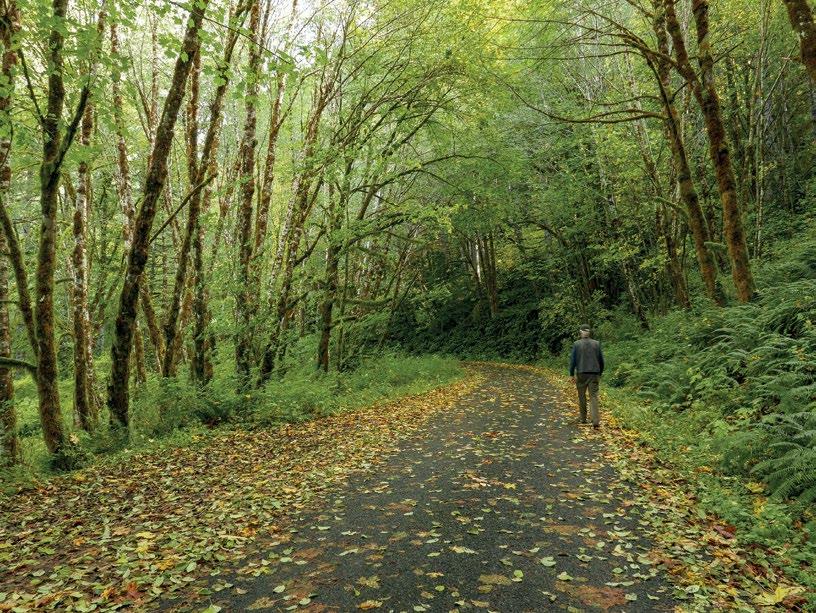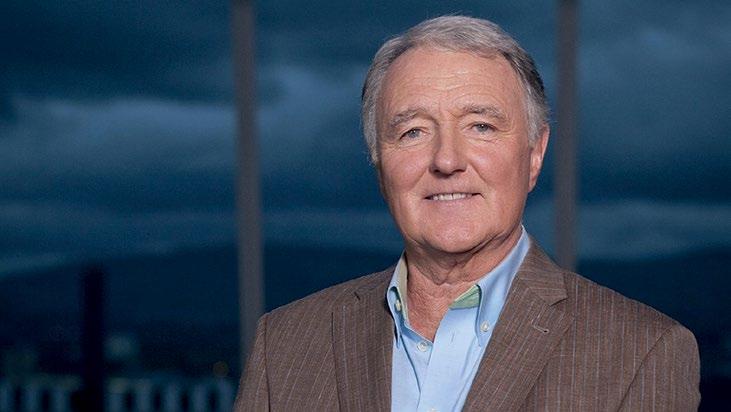
9 minute read
Open Mike / Exclusive Interview with Mike Murphy
Conor O’Hagan meets Mike Murphy . Now 78 and as energetically relaxed as ever, he claims – emphatically and just about plausibly – to be doing nothing these days.
To paraphrase Voltaire -- as one does, whenever the opportunity arises --if Mike Murphy hadn’t existed, it would probably have been necessary for RTE to invent him.
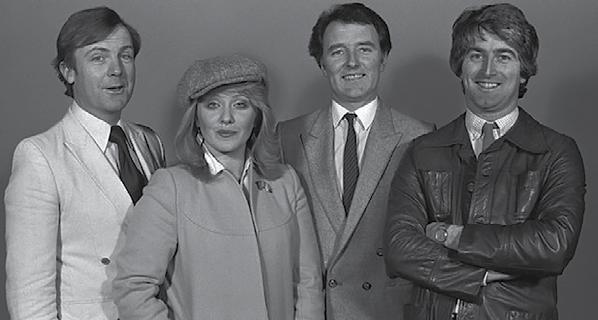
The quintessential Mr Versatile of Irish broadcasting; if anyone can lay claim to having been there and done that, plus quite a few other things along the way, it’s Mike Murphy. Now 78 and as energetically relaxed as ever, he claims – emphatically and just about plausibly – to be doing nothing these days.
The Live Mike team: Fran Dempsey, Twink, Mike Murphy, Dermot Morgan
‘Just trying to stay healthy, really. I walk, swim half a mile in the sea every day – that sort of thing.’
Not here in Ireland, you understand. The Murphys (Mike and second wife Anne) spend large parts of the year in Florida and Spain; the fruits of Mike’s successful career in business, rather than his 35 years as one of Ireland’s most ubiquitous TV faces.
He’s had a difficult year; a bad fall left him with a shattered shoulder and a long road back to recovery, including a major back operation and ‘unbelievably bad physical pain.’which to all intents and purposes he has managed. If he has aged as a result, it’s not obvious. Mike Murphy is in good shape.
And the voice; as easy on the ear as ever; paced, melodic and always just a little quizzical. Like his former friend, colleague and once mentor Terry Wogan’s, it’s a vehicle well-suited to light humour, or – as he demonstrated most effectively on The Arts Show – the presentation of the high-brow in middle-brow language. Or, come to think of it, just about anything except pomposity.
The national broadcaster has been, at least by its own reckoning, something of a legend factory since its birth in 1960. With the passing of Terry Wogan and this year, Gay Byrne, Murphy is the survivor of a generation that defined the character of RTE, probably forged its historical high point – and from whose shadow the present incumbents still struggle to escape. Is Ryan Tubridy the new Gay Byrne? Safe to say he’s not the new Mike Murphy.
Burdened with self-imposed mimicry of the BBC, but with a tiny fraction of its resources, RTE was always going to provide opportunities for the young Mike Murphy, once he had aborted unlikely careers in drapery and at Castrol Oil. With a naturally pleasant voice, honed by years acting with the Dublin Shakespeare Group and early RTE drama productions (he was offered, but turned down a scholarship at RADA), a clear middle-class South Dublin
accent easily polished for the favoured RP pronunciation of the day and just enough geniality to convey warmth and confidence on air
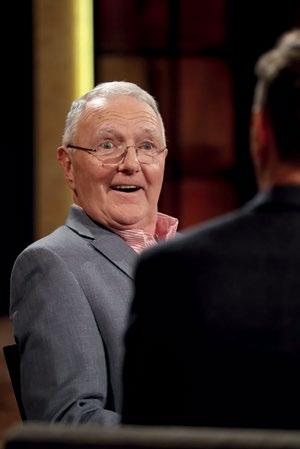
A paradox of Murphy’s career is that he was and perhaps still is held at arm’s length in the sniffier reaches of Irish intelligentsia. Strange, because during his tenure of The Arts Show he succeeded in wrestling the Arts into an unprecedented afternoon slot, with ratings that dwarf anything achieved before or since.
‘There was murder when it was announced that I was taking on The Arts Show,’ he recalls cheerfully. It was said that I was unqualified, but I learned on the job. I had always been interested, and in those 12 years I think I learned enough for three degrees.
‘The Arts slot had always been a career graveyard, but it wasn’t so for me. I like to think I lifted it. I wasn’t afraid to say that I didn’t understand what my guests were saying, and I think that the result was a show that brought
‘Ryan Tubridy is great at what he does, but it’s not the same ‘Town Hall’ that Gay presided over – I don’t think the show Gay created would work now’.

listeners closer – they learned with me. I was really annoyed that after I left, RTE’s scheduling department shuffled arts back to where it had been before me.’
Murphy has remarked in public that he didn’t consider himself ‘part of the organisation’ and that detachment has been clear on several well-publicised occasions. Famously, he announced the end of his stint on Live Mike live on-air; which was unwelcome news to RTE management.
‘They freaked, frankly. As did Gay. He was always more cautious than me and couldn’t understand why I’d done it. But I had run out of clichés – I couldn’t keep it up for another series. In simple terms, I was bored.’
‘So for a while, I was banished. They [RTE] simply didn’t know what to do with me. That was when I started up my production company, which went on to be the biggest in Ireland. And I went into business with an American I’d become friendly with. We bought out a number of smaller local and regional cable companies and brought them under one roof, operating from Sheriff Street in Dublin. It was when we sold that that I bought the property in Florida.
Terry Wogan, Mike Murphy’s former friend, colleague and mentor. Like Wogan’s Mike Murphy’s voice is a perfect vehicle for light humour.
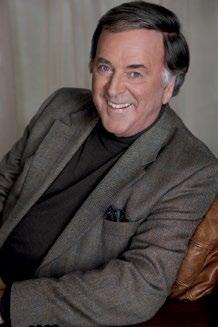
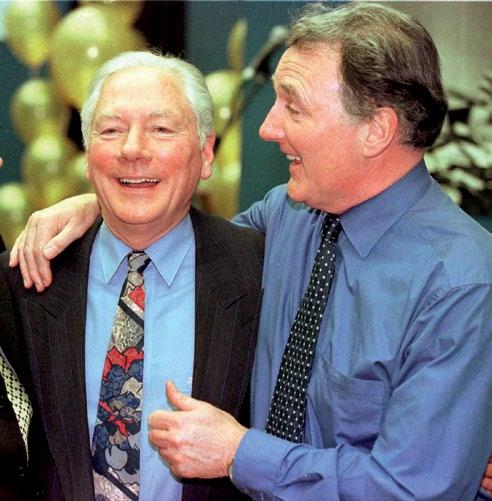
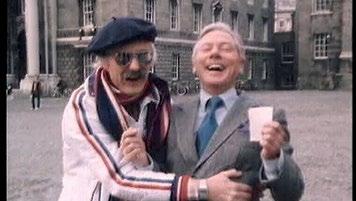
The celebrated ‘Frenchman’ sketch with Gay Byrne on The Live Mike.
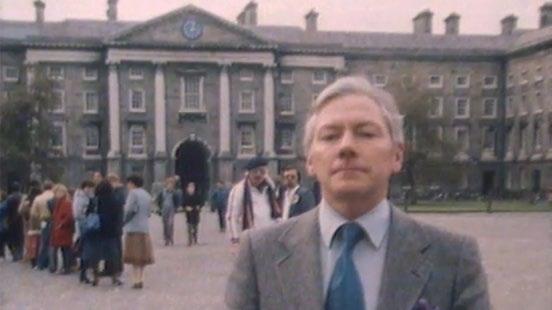
business as executive director of a business with interests in Ireland (including Dublin’s Park West and Belfast’s Titanic Quarter), Britain, the Caribbean and the USA. That ended in 2011, leaving Murphy, he says, gratefully unburned. His attachment to the broadcaster with which he spent over 35 years is clearly more personal than institutional. A close friend of Gay Byrne and his family, he was deeply affected by Byrne’s recent death.
‘I had written an Obituary for the Irish Times, which I think was a good tribute. I kept it light-ish, because I couldn’t have done anything else – it was just too emotional for me.
‘Along with Terry Wogan, Gay was, I think one of the great broadcasters of the 20th century, here or anywhere else. He worked tirelessly at everything he did. Before every programme he presented, he would go through the timings, the questions, the ad libs - everything before going on air, even if only in his head. The difference between me and those two was that I had what you might call a facility, whereas they had a talent that really set them apart’.
‘I think Gay got a great farewell from the nation, and oddly enough I think he would have been surprised. Years ago, he said he believed we would all be forgotten long before we died – that nobody would remember us. But he was wrong – about himself, anyway.
It’s true that an era passed when he retired. The Late Late Show is still there, but it’s a different programme and a different Ireland. Ryan Tubridy is great at what he does, but it’s not the same Town Hall that Gay presided over – I don’t think the show Gay created would work now.
We had a very close relationship – not just as colleagues but as friends. We used to holiday together every year. I don’t know if people fully understand the type of man he really was. He was intensely curious about people and was capable of saying some disconcerting things in the process of understanding people – abrasive at times. But he wasn’t a revolutionary by any means, or even a natural leader. On holiday he would appear at breakfast and ask ‘Well, what are we going to do today?’
‘And even though he did so much to challenge the Catholic Church’s grip on Ireland, he was a religious man, in a complicated way. He blamed religion for holding himself and Ireland back, and I certainly feel the same way. Looking back now, it seems ridiculous that we let things go on as they did for so long.
The pace of change hasn’t been as kind to RTE itself, as recent announcements from Montrose have confirmed.
‘There’s no doubt that RTE is in trouble. But I don’t think that capping salaries is going to be the answer. The fifteen percent they’re talking about cutting from the top salaries is window-dressing, and the truth is that the main targets are the very people who bring in the advertising revenues.
‘I don’t want to see RTE decimated in the way that some people are proposing, but there’s no question that morale there is at a very low ebb, and something has to change. Pat Kenny [who crossed over to the dark side, Newstalk FM and Virgin Media after 41 years at RTE] said to me recently that he thought we were very lucky to have worked there at a time when it was fun. Now there doesn’t seem to be any fun.‘Above all, down the road, public service broadcasting must survive – in Ireland and internationally. I’d be appalled if that tradition were to be lost. When you look at that clown Trump and what he’s doing, you realise that fake news is becoming synonymous with any news output. When serious news stories
arise, people need and want organisations like RTE to deliver the facts. It has to survive as a source of truth.
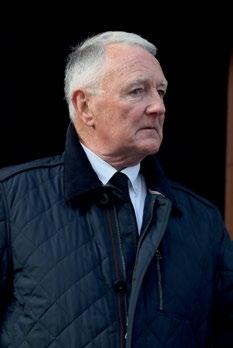
‘To be perfectly frank, there’s some appalling rubbish on TV – ghastly, contrived things like [names several recent Reality TV series]. They haven’t got their act together, and it shows. ‘And to be honest, I’ve done a lot of programmes I’m not particularly proud of – some pretty ghastly stuff, I’m not ashamed to admit. But it was a long and varied career and not surprisingly, sometimes I got the tone wrong, so there are some things I hope are never shown again.
‘But there are certainly things I am proud of. The four Jacobs Awards - Gay got six, I think - are important to me. Two of them were for series that I found the money for and produced myself; Murphy’s America and Murphy’s Australia. There was another for Live Mike and one for Morning Call. Live Mike was the only RTE series that ever challenged The Late Late Show for ratings. And on the radio, Morning Call was a huge success – though it made for a bloody tough lifestyle, for me and my family.’
Fame, he insists, has never been the spur. ‘I remember saying once that I had all the friends I ever wanted to make. Unlike Gay, I never enjoyed the attention, or the hobknobbing. He used to love it, though he also saw it as a responsibility that went with his position. I didn’t feel that. I’m still self-conscious about being recognised.’






